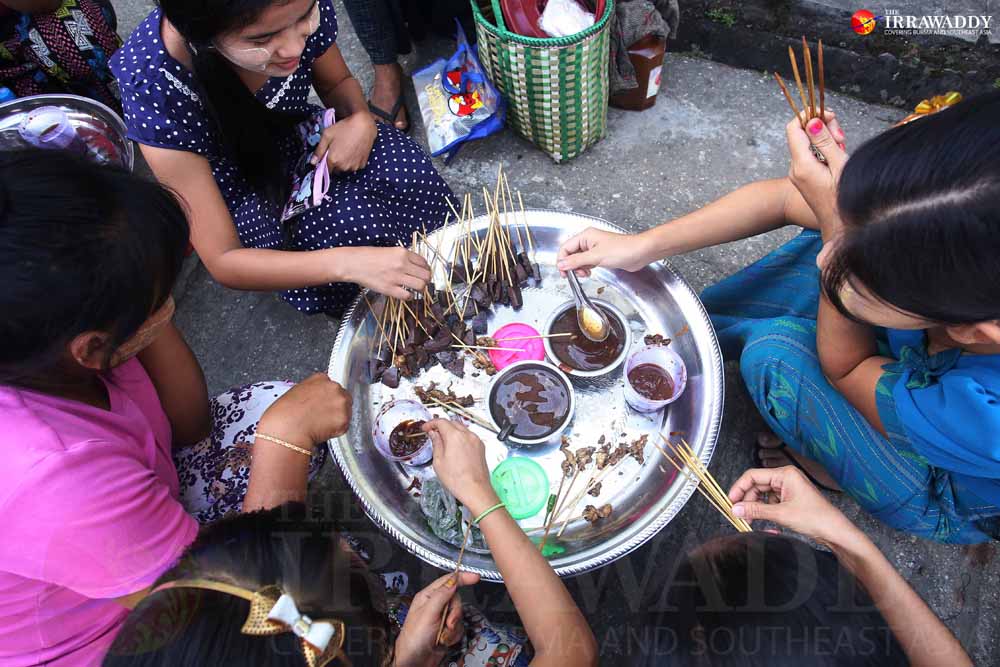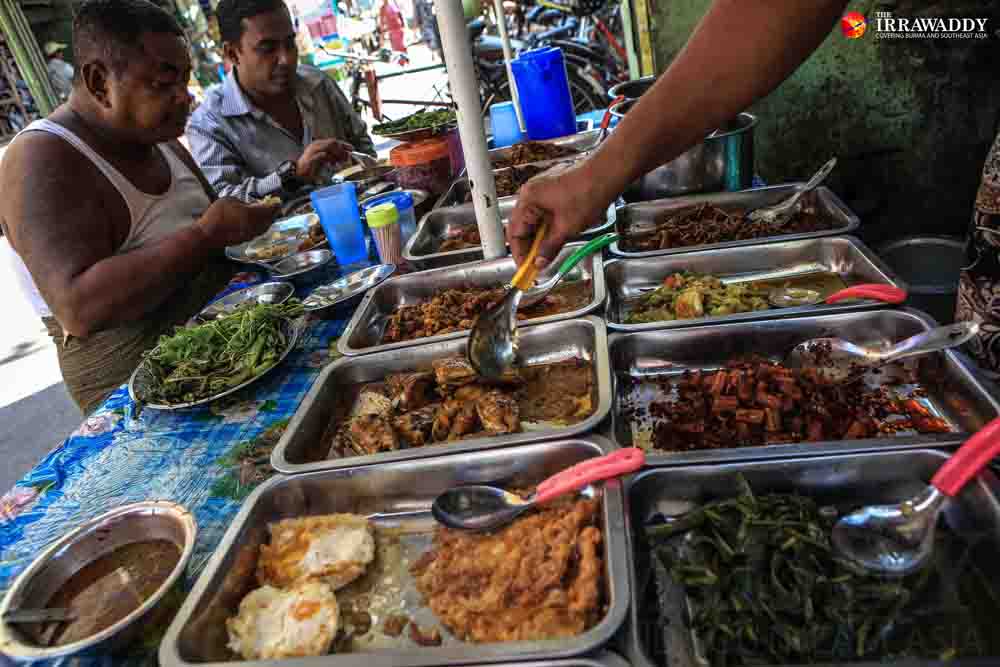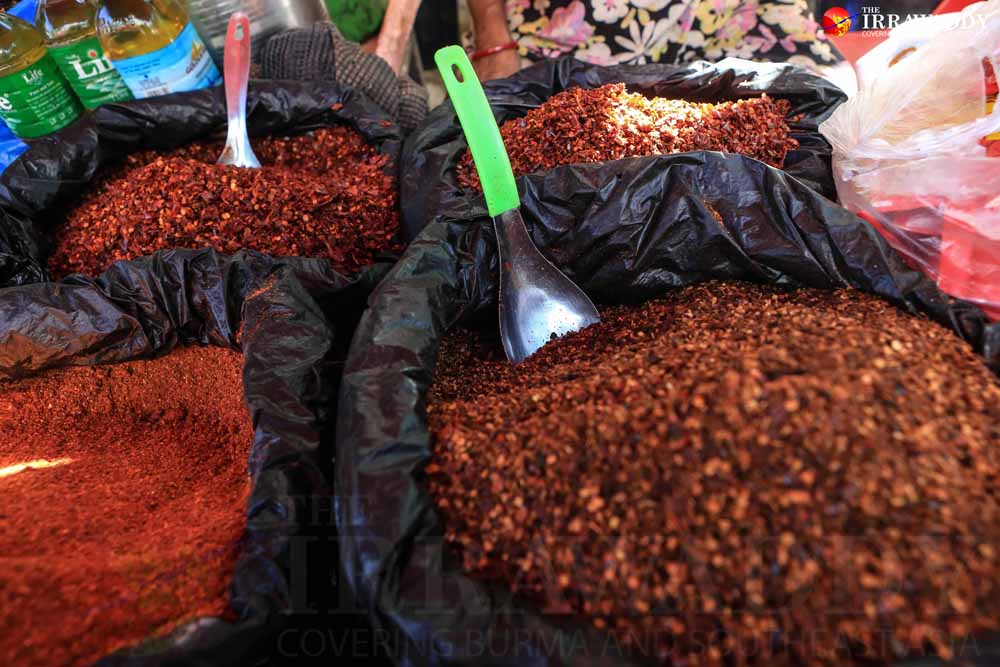RANGOON — “I feel like I consume poison every day. I drink cheap liquor. I eat food that contains dye. It is colorful, quick, easy and cheap,” said Kyi Lin, 59, who was diagnosed with liver disease.
Kyi Lin is skinny and jaundiced. He often feels tired and dizzy. A friend of his says since he began receiving medical treatment last year, his weight is half of what it once was.
“For more than 20 years I drank a lot … and I drank all kinds of alcohol,” he said, while waiting in Rangoon’s crowded North Okkalapa General Hospital to receive care.
Doctors say that quick and easy meals from street vendors and fake liquor can lead to life-threatening problems, adding that unsafe food and beverages can cause cancer.
“The number of cancer patients is increasing,” said Dr. Kyi Soe, the head of Rangoon’s North Okkalapa General Hospital, pointing to a hospital diagram showing a sharp increase in cancer patients since 2012.

Hospital statistics show that there were 1,300 cancer patients in 2012, 2,300 patients in 2013 and 4,000 patients in 2014. According to the latest figures, there were 6,000 cancer patients in 2015.
“We prioritize people with emergency situations and we hold off on minor cases. We have a long list of cancer patients who have been waiting for operations. The current waiting list goes through June,” said Dr. Kyi Soe, who oversees the hospital.
He said colorectal and stomach cancers are the most common in males while breast and cervical cancers are found in high rates among female patients. They also see cases of lung, head, and neck cancers.
Dr. Kyi Soe said that cancers are related to lifestyle and diet—including drinking, smoking and bad eating habits. Additionally, foods that contain chemical dyes, pesticides, artificial colors and fertilizers are another factor. These are often found in ready-made products, preserved foods and food prepared by street vendors.

“We rarely eat out. My family eats fruits and vegetables at home but we still have to be careful. We clean our food repeatedly before eating it. Some Burmese noodles contain formalin. There is a growing food safety risk,” said Kyi Soe.
Physicians say unsafe foods from street vendors, grocery stores and restaurants contribute to illnesses including diabetes, hypertension and cancer. Burmese consumers commonly assume that their street food is unsafe and foreign tourists and expats often experience food poisoning.
Despite the risks, it is difficult for consumers to avoid unsafe foods.
Fifty-seven year old cancer patient Daw Khin Lae Lae Myint said, “I know what we eat everyday can contribute to cancer but we can’t avoid it. I consume it even though I know the risks.”
North Okkalapa Hospital is packed with patients awaiting medical examinations and treatment. In a tiny room allotted to the cancer department, two specialists consult patients. It has been busy since they began seeing patients at 8 a.m.

Another patient, U Maung Maung Phone, 59, who was diagnosed with colorectal, stomach, and lung cancer awaits treatment. He began treatment in April 2015 and has since undergone one operation to remove a large tumor from his stomach.
He shows his scar and details his illness.
“I thought I was cured. But later, the cancer spread to my lung. My kidney was also bruised during treatment. Now I suffer from many things. I vomit often. I’m constipated. I have to eat only boiled rice and soup. It is very difficult,” he added.
The Rangoon-based Consumer Protection Association said fake alcohol, colored meats, curries and ready-made meals are a threat to public health.
Ba Oak Khine, director of the Consumer Protection Association, said that 80 percent of the food in Burma is unsafe and that the majority of foods that people consume contain chemical dyes.
“Tea is colored. Cooking oil is used to fry food repeatedly. Formalin is used to preserve noodles. Most vegetables contain pesticides and many chili powders contain chemical dye,” said Ba Oak Khine.
“The things we eat and drink in everyday life aren’t safe,” he added. “It is not only food, but even drugs can be fake. It is hard to avoid. I feel like there is nothing we can eat.”
Other common diseases caused by unhealthy food and poor lifestyle are hypertension, diabetes, heart disease and high cholesterol. According to Burmese hearts specialists, 50 percent of the population has high cholesterol and nearly one in three citizens has hypertension.
At the Asean Federation of Cardiology Congress in Rangoon in October, specialists warned Burmese consumers about unhealthy lifestyle habits after these statistics were revealed.
Dr. Nwe Nwe, the head of cardiology at Yangon General Hospital, said at the event, “Poor lifestyle choices are unfortunately becoming the norm. The result is that more people have coronary artery disease, stroke and renal failure than ever before.”
She also said that consumption of salt is high in Burma, with people preferring to eat preserved foods with a high salt content.
Statistics show that 25–30 percent of the population over the age of 40 has hypertension, about half of all adults have high cholesterol and 12 percent have diabetes.
In September, the Department of Health’s Food and Drug Administration (FDA) seized fake and expired drugs in Rangoon worth US$2.2 million as well as equipment used to produce fake drugs.
Taxi driver Lin Lin said he knows that some of the food he consumes is unsafe but he cannot afford better, cleaner meals.
“I can’t imagine eating at expensive restaurants. I eat street food. I got food poisoning the first several times but now I’m okay,” he said.

















